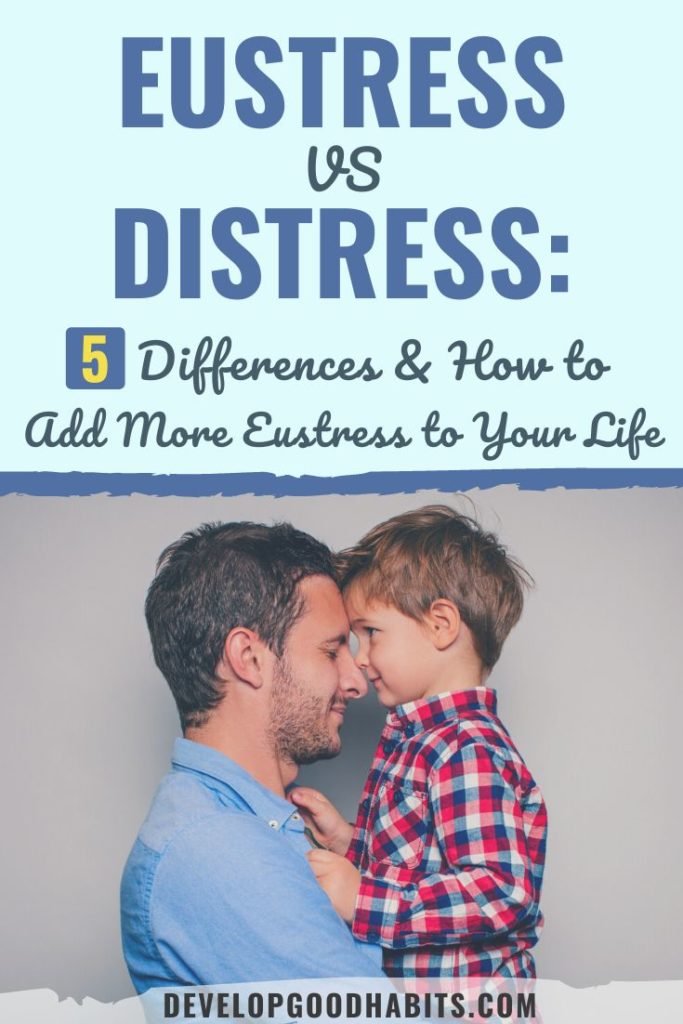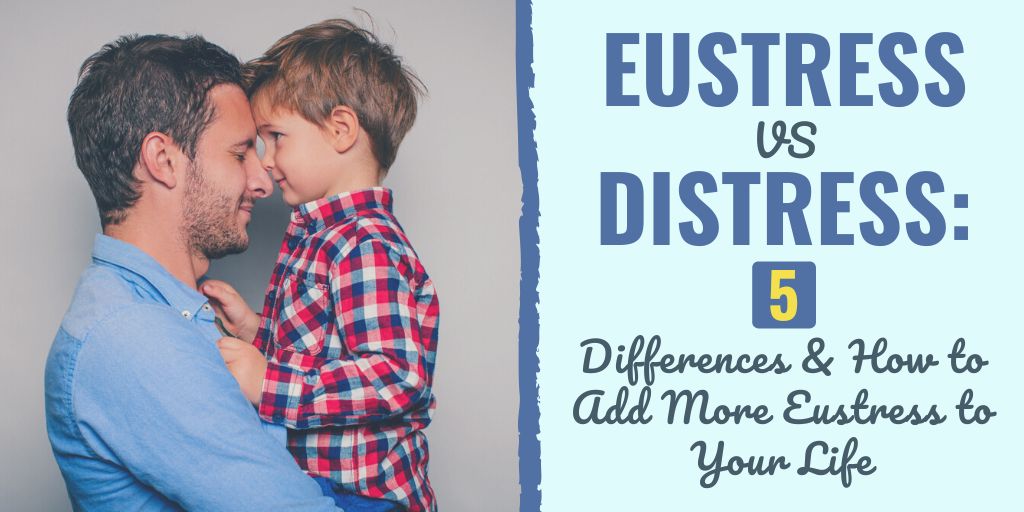There might be affiliate links on this page, which means we get a small commission of anything you buy. As an Amazon Associate we earn from qualifying purchases. Please do your own research before making any online purchase.
Stress is your body's response to any change that may create a taxing demand on your physical or mental health. Despite popular beliefs, stress can be beneficial at times… as it helps you get out of your comfort zone, improve focus and overcome challenges.
This good type of stress is called eustress. The difference between good and bad stress often boils down to our coping mechanisms and our mind’s capacity to handle various situations without falling apart.
Today, we’re going to take a look at eustress vs distress… or, as it is more commonly referred to, good stress vs bad stress.
What is Eustress?
Eustress is the kind of stress that we experience when we are facing a challenge that we know will turn out okay. It is the kind of stress that allows us to become motivated to push through because we know the end result will be worth it.
We are also confident we have both the external and internal resources to get through.
Some situations that create eustress include:
When we are experiencing eustress, we may be feeling nervous, but we also know we can handle what is to come. This is because eustress:
During eustress, things are viewed as more of a challenge than a problem. You have a feeling of hope in the outcome and know how to rely on the available resources.
Eustress and Flow
Mihaly Csikszentmihalyi was a psychologist that originally addressed the concept of flow. Flow is the state where we are often most productive. Eustress shares many of the same qualities as flow. With flow:
- There is a situation that is challenging, but not too difficult.
- Enjoyable tasks are involved, such as things like pushing the limits when exercising, traveling to a new place, or doing something you have never done before but find exciting.
- Your right frontal cortex is fully engaged.
- Your concentration is intense and distractions are very few.
- There is a loss in the sense of how much time has passed.
Now, let's take a quick look at what distress entails.
What is Distress?
Distress is the type of stress we think about when the subject comes up. This is the fear or anxiety we feel when faced with a situation that we don't think we can handle. It may feel like there is no hope and no way for the situation to turn out for the best.

Things that cause distress can include:
When facing stress, you may quickly feel overwhelmed and like the world is ending. Distress:
Physically, your body reacts to any stress the same way. When we are stressed, our brain releases chemicals that initiate a flight or fight condition. The biggest difference between distress and eustress is how you react emotionally.
Before you can deal with either, it is important to determine which type of stress you are dealing with.
Eustress vs Distress: Five Differences
When you are trying to determine whether you are feeling eustress or distress, examine how you feel when asking the following questions.
1. What is my energy like?
2. How focused am I?
3. Am I excited?
4. What is my confidence level?
5. Am I thinking positively or negatively?
You can change many instances of distress to eustress if you start viewing the situation as a challenge to learn from rather than a hindrance. You can also take a minute to evaluate the resources available to you and learn to utilize them more effectively.
Ways to Add More Eustress to Your Life
Adding eustress to your life will help you grow emotionally. It will build your confidence and self-esteem and help you become better motivated to be more productive.
You will learn to push past your preconceived limits and grow. There are several ways in which you can add eustress to your life.
Seek it out.
Any time you step out of your comfort zone or attempt to stretch your limits, you are able to create eustress. The trick is to make it a challenge that causes you to do more than you have before, but doesn't make it so difficult you get discouraged.
For example, try to increase your speed, distance, or repetitions in a sport you love. Try that new rollercoaster that just opened or take the leap and go to Spain, even if you don't know Spanish.
Make the challenge easier.
Treat overcoming the challenge like a goal. Break it down into a number of steps and tackle each step individually.
Do you have to present that great idea you took to your boss at the next meeting of stockholders? Write a great report and have someone review it. Practice in front of the mirror. Practice deep breathing or other calming techniques. Remind yourself that your boss loved the idea. Now, go deliver that presentation.
Increase resources.
Having more resources allows you to relax and feel better about the outcome. If financial stress is something you face, find a second source of income.
If you are facing a challenge that requires moral support, initiate the help of your support network.
If you are thinking of buying a home, do your research and prepare by seeking a real estate counselor.
When you have the proper resources, you can change the fear into excitement because you know you have what it takes to succeed.
Develop a Growth Mindset.
People with a fixed mindset believe that where they are in regard to skills, talent, etc… is something that can't be changed. But with a growth mindset, you believe you have the ability to keep learning.

You know you are capable of doing more than you currently do or have done. By believing in yourself, you increase your self-esteem and this allows you to approach both challenges and the world outside your comfort zone with anticipation. What can you learn from the situation?
Focus on the wanted outcome.
Picture this: you are looking at buying a piece of lake property and live off-grid. That has always been a dream, but anxiety is trying to take hold. You will have to leave everything you are familiar with – your job, your friends and the comfort of your current home – and learn skills to help you survive away from a town environment.
If you allow the anxiety to settle in by focusing on these aspects, you won't go. However, if you keep your eye on how you will feel once you are sitting there in that cabin, you can overcome the fear and take the necessary steps to achieve it.
Find the positives.
Almost every situation has some positive aspects in it. Your marriage has ended, but it gives you the chance to find a more supportive partner.
You get fired, but now you have time to start that business you have been thinking of starting and never had the time.
Do all you can to find the positive things within the situation and focus on them. It promises to change your entire outlook.
Focus on what you can control.
There will always be some things you simply can't control. The good thing is that there are always aspects you can control, even if it is only how you respond to the situation.
Try studying some of the Stoic principles and learning that the Universe isn't targeting you. Think about the lessons you can learn or what a change of attitude could change about the situation.
You do have some control, use it.
Too Much of a Good Thing?
Even good things can be overdone. Eustress is, after all, a form of stress. You can't keep up this state continuously, as your body needs time to settle and regenerate. Some things you can do to make sure your body has this time include:
Final Thoughts on Eustress vs Distress
Stress is inevitable. Your body uses it to warn you that change is coming and you are being asked to step out of your comfort zone. By learning how to turn distress into eustress, you are allowing yourself to grow and become the best person you can be… in small increments.
You won't ever be able to eliminate bad stress completely, but by dealing with good stress effectively, you are giving yourself greater tools to handle distress and get through to the other side.
You will become more resilient and mentally stronger. You will become someone who thrives!
Finally, if you need help with building habits, then check out this nine-step blueprint that walks you through the entire process of creating lifelong habits.)


